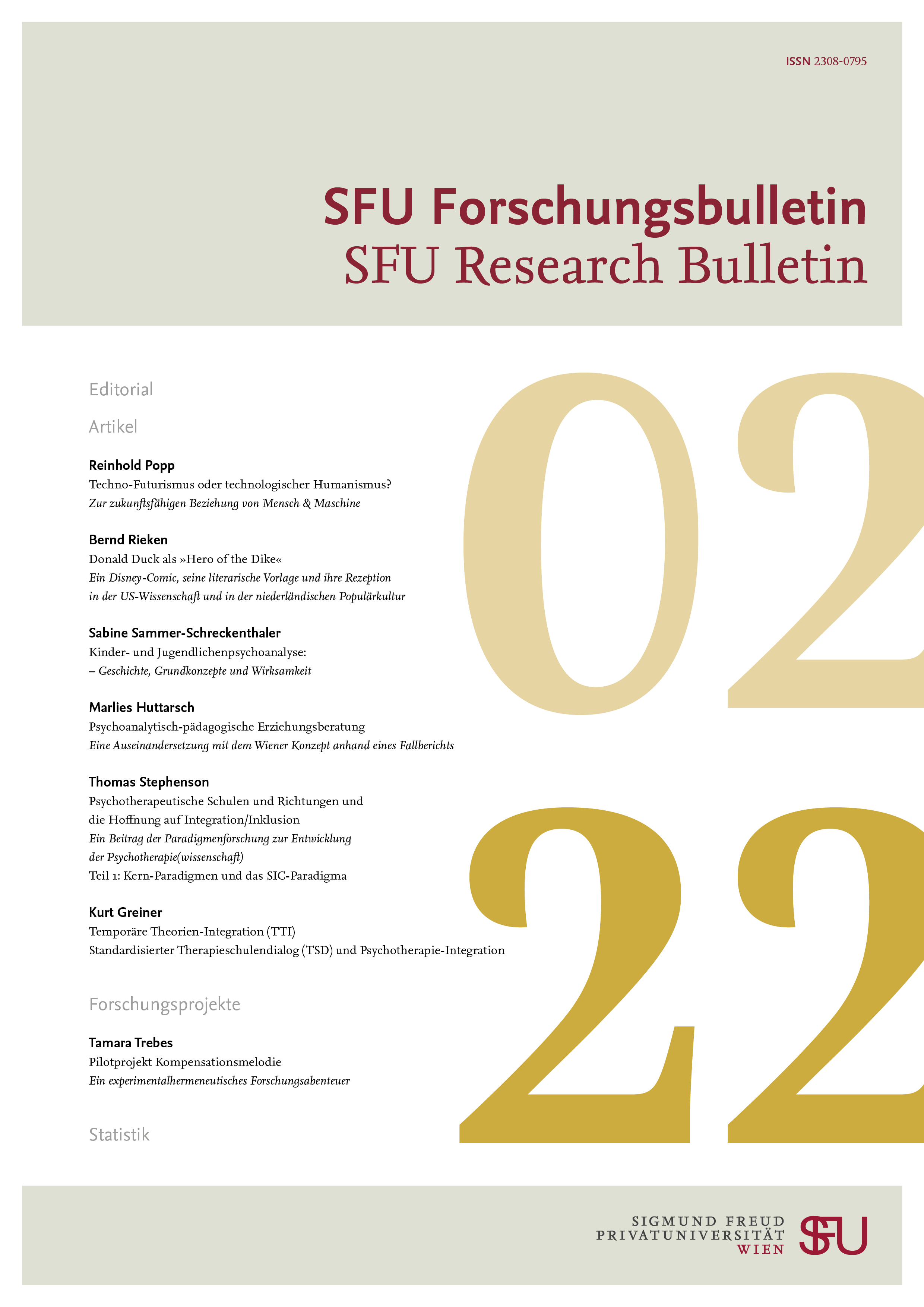Psychotherapeutic schools and directions and the hope for integration/inclusion
A contribution of paradigm research to the development of psychotherapy(science)
DOI:
https://doi.org/10.15135/2022.10.2.79-94Abstract
At the beginning of psychotherapy there was one single "school of therapy" - Sigmund Freud's psychoanalysis. In 2022 there are 23 accredited therapeutic schools in Austria - and a much larger number of "forms of therapy". The entire history of psychotherapy, which spans more than a hundred years, is characterised by increasing diversification, but also by competition and territorial struggles. Accordingly, there are voices calling for a one-size-fits-all therapy to replace all the individual schools, as well as voices arguing either for a continuation of the parallel existing schools without hybrid forms and integration attitudes - or for a "bridging knowledge" that could serve as a common basis and leave the identity of the different schools untouched. In this article, core paradigms as guiding basic assumptions of the four psychotherapeutic directions and the SIC paradigm as a "bridge element" between these four core paradigms are unfolded using three fictitious cases. The sample cases of borderline, compulsion and phobia served as concretising application cases and as illustrations of the basic theoretical assumptions located at the highest levels of abstraction, which could be applied to all diagnoses, but also to the understanding of all non-pathological individual and social phenomena.
References
Bion, W. R. (1962). Eine Theorie des Denkens. In Bott Spillius, Elizabeth (Hrsg.) (1988).
Melanie Klein heute. Bd. 1, München, Wien: Verlag Internationales Psychoanalyse 1990.
Freud, S. (1895). Studien über Hysterie. GW I, 81-251: Frankfurt am Main: Fischer 1999.
Greiner, K. (2012). Standardisierter Therapieschulendialog (TSD). Therapieschulen-interdisziplinäre Grundlagenforschung an der Sigmund-Freud-Privatuniversität Wien/Paris (SFU). Wien: Sigmund-Freud-Privatuniversitäts-Verlag.
Kriz, J. (2014). Grundkonzepte der Psychotherapie. Weinheim, Basel: Beltz.
Leitner, A., & Höfner, C. (2020). Handbuch der Integrativen Therapie. Berlin: Springer.
Nijenhuis, E. (2016). Die Trauma-Trinität. Ignoranz-Fragilität-Kontrolle. Die Entwicklung des Traumabegriffs/Traumabedingte Dissoziation: Konzept und Fakten. Göttingen: Vandenhoeck & Ruprecht.
Nijenhuis, E. (2018). Die Traumatrinität: Ignoranz-Fragilität-Kontrolle. Enaktive Traumatherapie. Göttingen: Vandenhoeck & Ruprecht.
Petzold, H. G. (1993). Integrative Therapie. Modelle, Theorien und Methoden für eine schulenübergreifende Psychotherapie. Paderborn: Junfermann.
Stephenson, T. (2003). Paradigma und Pädagogik. Wien: Empirie-Verlag.
Stephenson, T. (2020). Heilsame Kompetenzen aufbauen: Warum eine universitäre Psychotherapieausbildung eine psychotherapeutische Hochschuldidaktik benötigt. In Pritz, Alfred, Fiegl, Jutta, & Rieken, Bernd, Universitäres Psychotherapiestudium. Das Modell der Sigmund Freud PrivatUniversität (S. 207–241). Lengerich: Pabst Science Publishers.
Stephenson, T. (2022). Die (traumatisierte) Innere Gemeinschaft. Grundzüge einer spezifisch indindividualpsychologischen Traumatheorie/Traumatherapie auf der Basis der S-I-C-Paradigmenkonstellation. Teil 1: Die S-I-C-Paradigmenkonstellation. Zeitschrift für freie psychoanalytische Forschung und Individualpsychologie 10(2), S. 1–21.
Strauß, B., Galliker, M., Linden, M., & Schweitzer, J. (2021). Ideengeschichte der Psychotherapieverfahren: Theorien, Konzepte, Methoden. Stuttgart: Kohlhammer.
Stumm, G. (2011). Psychotherapie: Schulen und Methoden. Eine Orientierungshilfe für Theorie und Praxis. Wien: Falter.
Stumm, G., & Pritz, A. (2007). Wörterbuch der Psychotherapie. Wien: Springer.
Stumm, G., Pritz, A., Gumhalter, P., Nemeskeri, N., & Voracek, M. (2005). Personenlexikon der Psychotherapie. Wien; New York: Springer.
Downloads
Published
Issue
Section
License
The reproduction of articles published in any form is allowed under the condition that the citation is comprehensive. Prints in other publication media or public media require the written consent of the editor and can be requested under: forschung@sfu.ac.at
